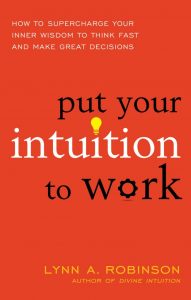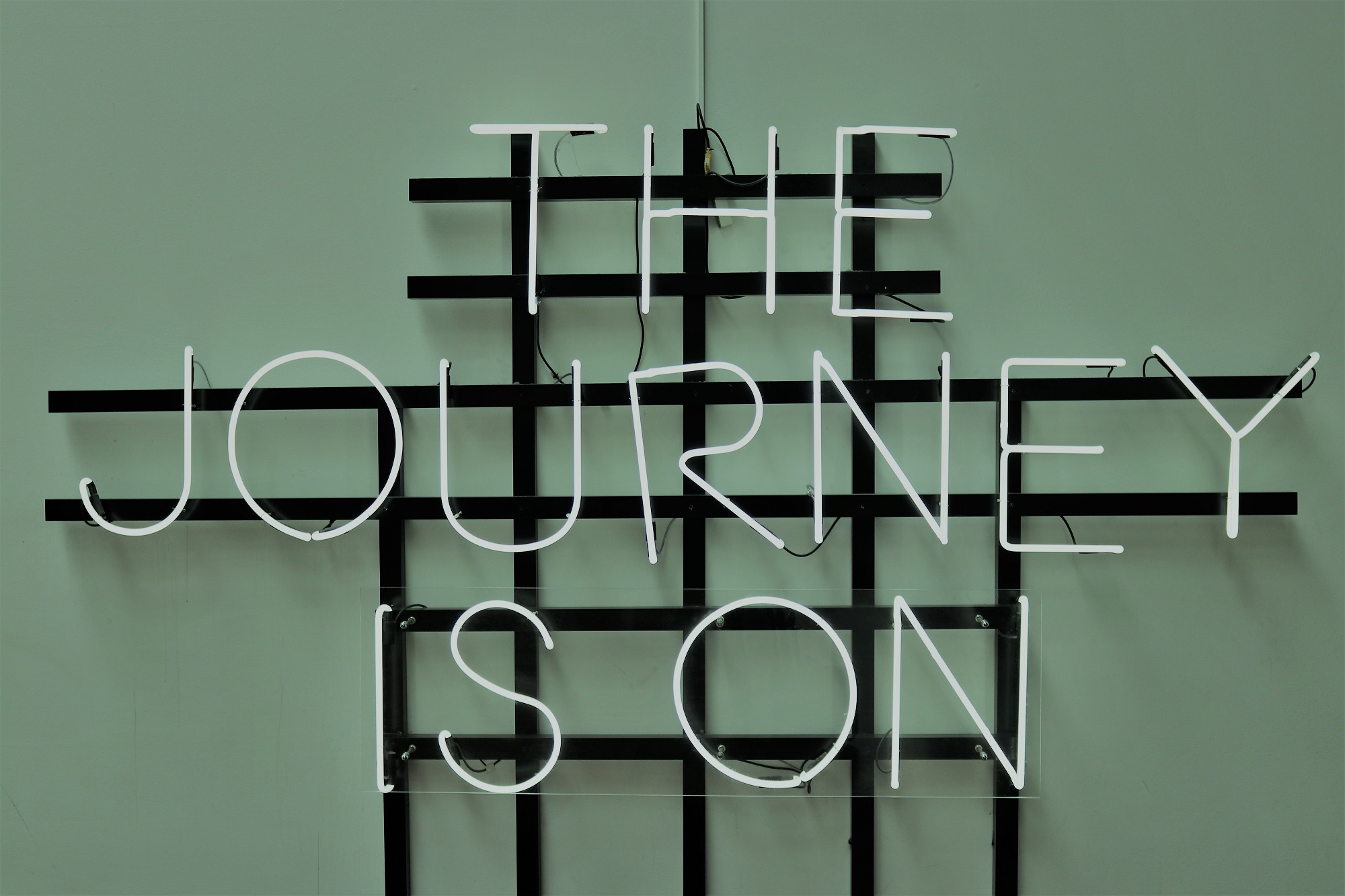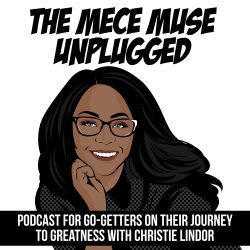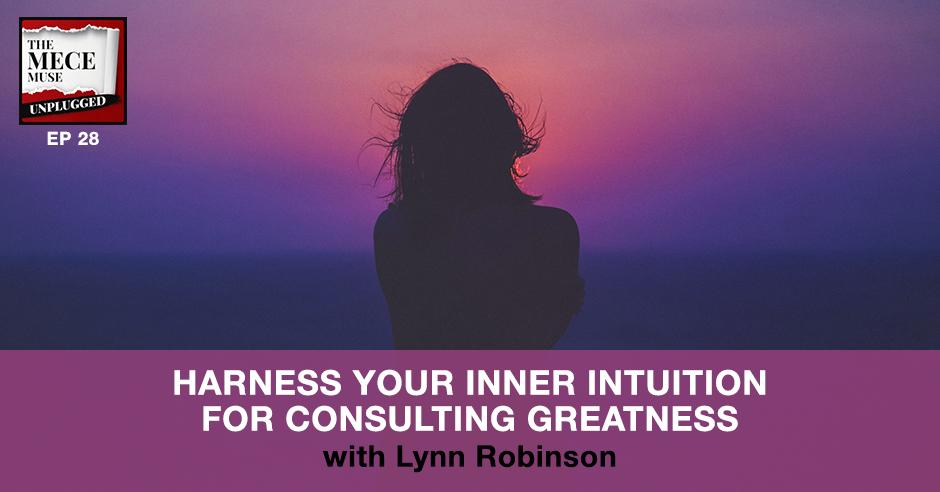Quick Wins interview with bestselling author and Intuitive Advisor Lynn Robinson, one of the nation’s leading speakers on the hot topic of developing and trusting our intuition. She teaches how to tap into the power of your “Inner GPS” Her clients consistently praise her uncanny intuitive insights as “spot on,” resulting in personal clarity, creative solutions and overall business success. Lynn has authored seven books on intuition that have been published in over 15 languages.
“Make today the day you start trusting your intuition.”
In today’s episode, Lynn defines intuition and explains how it should be a key skill for consultants use for their decision-making success and shares a techniques to help you tap into your inner voice in a way you can create insights and creative solutions for your clients as well as bring clarity to your life.
Listen to the Episode Here:
Podcast: Play in new window | Download | Embed
Subscribe: Apple Podcasts | Email | TuneIn | RSS | More
We will be doing a segment that I call Quick Wins. Quick Wins is when I have the utmost pleasure to connect with individuals, sharing ideas, products, or services to help round out your consulting toolkit. We’ve got intuitive advisor Lynn Robinson as our guest. She is also a bestselling author and one of the nation’s leading speakers on the topic of developing and trusting our intuition. You’ll get a copy of her book. It’s called How to Listen to Your Inner CEO. You can check that out. In our conversation, what’s really cool is she provides a three-step technique that you can actually use now to begin really harnessing and owning your intuition. You can also get your copy of the MECE Muse Manifesto of Great Consultants, which is also a great addition to your toolkit. The Manifesto comes directly from my book, The MECE Muse.
You can check that out and start putting that to action. Let me know what your thoughts are about the Manifesto. You can definitely drop us a line MECEMuseUnplugged@Gmail.com. We’re still running our feedback survey, so thank you so much for go-getters that’s provided some feedback to us. We are running a six-week improvement stud, wanting to get feedback on the podcast show and how we could improve. Feel free to take our survey. It’s on our website or you can drop us a line as well. We’d love to hear from you. Either or any way we can really improve the show. We’ve got an exciting guest lined up for 2018. I can’t wait to begin that. With that, let’s get started.
Interview with Lynn Robinson
Lynn, thank you so much for taking time to connect with us on The MECE Muse Unplugged. How are you doing?
I’m great and it’s so nice to meet you, Christie. Thanks for having me on your show.
Before we get started, maybe we can take a moment to introduce yourself to the go-getters of The MECE Muse Unplugged.

I’m the author of seven books on the topic of intuition. My latest book is called Put Your Intuition to Work and I had my business for almost 30 years and I work as an intuitive advisor, and I was joking with Christie. Sometimes, I wish I was an accountant or something really normal so that when people ask me what I do, they would get it immediately. I’m an intuitive advisor so people usually call me when they’re in the midst of change and transition and trying to figure out next steps or getting some insight into a client or a product that they want to have some information about and I use my intuition and I hopefully help you use yours to figure out what the next steps are, what might be standing in the way or some insight that you might not be able to get on a logical or rational level.
What I think is so great about you being an intuitive advisor, I know for myself that I rely on my intuition quite a bit and I realized over the years that, as a consultant, the more I listened to my intuition, it gets louder. I notice that I’m able to have better answers. I have better clarity with decisions that I make. I’m able to really help my clients more with a little bit more kind of breadth and depth to the recommendations I provide. It’s like, more intuitive thinking begets more intuitive thinking. I never realized how powerful intuition was. When I heard about your book and your expertise, I was like, “I want the go-getters to understand how they can really tap into their own intuition.”How did you get into this type of work?
It’s a very weird story. I was actually the operations manager of a software company in Boston. I know that it wasn’t what I wanted to be when I grow up. I was just feeling really bored. It wasn’t what I wanted to be doing. I went to see a career coach during that time and I said, “I don’t know what I want to do.” I know that I would like to be an entrepreneur. I would like to be helping people. Everything was so vague. I thought about being a psychologist, but I didn’t want to go back to graduate school. I was just really perplexed and during that time, I went to take a class on intuition development and I discovered that I was really good at it. We did these partner exercises in the class and people would say, “How did you know that about me? How did you know about that situation? That information is so spot on.” I was like, “Really?” I went back to my career coach the next week and I said, “Is there something I can do being an intuitive advisor?” Then I just discarded it because it was too weird and I joked that it wasn’t the ad that you found in the help wanted section of the Boston Globe Newspaper.
She was one of those very early adopters of using visualization and affirmation out of Law of Attraction, and she said, “Don’t discard this idea. Just imagine yourself having a successful business. Imagine your appointment book full of clients. Imagine that you’ve got a beautiful office. Imagine you’ve got happy clients. Maybe you could imagine yourself as a speaker.” I did all of that and for several weeks I was doing it, nothing really happened. What happened next was so strange. A friend of mine died and I went to his funeral. There were several hundred people at the service in the funeral home. I was going to sit next to a couple of my friends, but I walked in and I heard a woman say, “Please sit there.” There was a woman sitting next to me that had an empty seat and so I sat down and I’m thinking, “That’s strange that there are seating assignments at a funeral.” I turned around to look at the woman who I thought had said this, there was no one there.
I still don’t know what that was about, if it was my intuition or something else, but at the end of the service, this woman and I that I was sitting next to started chatting and she said, “What do you do for a living?” I was the operations manager for a software company, but I ended up blurting out, “I’m an intuitive advisor.” I had not intended to say that. I was mortified. I was embarrassed and I ended up giving her a session the next week and I was so nervous. It was the first time I’d really given a reading to a stranger outside of the class, and at the end I said, “I didn’t really ask you what you do for a living.”She said, “I thought I told you. I’m a writer for the Boston Globe Newspaper.”She wrote an article about me and I got 500 clients in the next month. It was a total Law of Attraction and manifestation story and I’m such a big fan of using those skills of affirmations, visualization, getting clear of what you want and then using your intuition. It was really a great story because it illustrates all of those pieces of it.
That’s one of the best stories I’ve heard on the podcast show.
Thank you. I feel good now.
Let’s unpack what intuition is for everyone saying like, “What are they talking about?” We can start by you sharing your definition of what intuition means.
The dictionary definition, which is probably the most boring one, is quick and ready insight. My favorite definition is one from a fifteen-year-old girl and she said, “Intuition is like when you know something but where did it come from?” My own definition is intuition is like our inner CEO, our inner GPS. I believe it’s something that we’re all born with and people call it by lots of different names, their instincts, their gut feeling, their intuition, their inner wisdom, their inner guidance. Some people think of it as a spiritual thing. That it’s God or a spirit guide if you want to get a little New Age-y about it. I believe it exists in absolutely all of us and it doesn’t matter what you call it or even how you receive it because we all receive it in different ways. Some people get that still quiet inner voice. That’s one of the main ways we hear about intuition. I frankly wish it would turn up the volume quite a bit. Some people get it as that gut instinct. You’re about to make a decision and your stomach cramps up or your shoulders get tight. Sometimes it’s a different physical sensation than just a gut feeling.
Other people describe it as a knowing. It’s like an a-ha moment, like, “That’s a good idea.” I bet that’s what you find happens a lot in your consulting business, that you’re working with somebody and an idea just pops in your mind or you have a feeling about something and or an idea might emerge. All of those are intuition. It is hard to talk about it because it’s very ephemeral, it’s very intangible, but as you said, that the more you use it, the better you get at it. You tend not to doubt it so much anymore. It just becomes, “What does my gut say? Or what does my intuition say?” You just start to access that. It is a part of us that helps us make successful decisions and have a happy life. People often say, “I get that inner voice or I get those knowings.” A very basic way of trusting your intuition is if something feels exciting, interesting, energizing, and you’re curious about it, that’s your intuition saying, “Go in that direction.” The opposite is true too. If you feel drained, you’re bored, you’re enervated, you’re procrastinating or crazy about something, that’s usually your intuition saying, “There’s something off here. Don’t go towards it or move away from it.”
That’s good advice for everyone who are thinking about a career. If somebody is saying to you, “You really ought to be a doctor, you really ought to be a lawyer, or you ought to be an Indian Chief,” and it just feels like that’s not what you want, maybe it makes logical sense because maybe a lot of the things you’re thinking about, make money or they’re well-thought of in our culture, but if it doesn’t make you feel excited or energized or you can’t imagine a life doing that, then that’s your intuition saying, “Don’t go there.” I always tell people, “If I can make a living doing what I do, you can make a living doing anything.” I had to trust that intuition myself to say there’s something here besides being the operations manager of a software company and I’m not quite sure what it is, but I’m going to follow the clues.
What’s so interesting about what you just shared is it behooves me how much people fight that. You mentioned earlier that it is an innate skill we all have as human beings. Yet, time and time again, I feel like hundreds of conversations I’ve had with mentees or people on my team or even friends and family and if something happens or goes awry, they’ll say, ” I should’ve listened. My gut told me,” and for whatever reason, they trusted rationale versus their gut. They trusted the facts versus their gut. They trusted seeking approval versus their gut. Why do you think that happens?
It’s human nature that we want to be in control and we want to guarantee a positive outcome. When we go with what’s worked for everybody else or what the culture values, it may seem like we’re going after a sure thing. Yet, we’re also individual and what works for me does not work for you. I remember working early in my career where this woman who was a very left brain coach and she’s like, “Here’s the marketing thing you have to do and you have to go out here and you have to do X number of speaking engagements, and you have to do this and you have to do that,” and for about six months, I did exactly all the she said. I was so burnt out and fried. I just wanted to throw in the towel. I didn’t want to do this anymore.
What may surprise people because I know I don’t sound like an introvert, but I really am. All of those things that she was suggesting were very extroverted things. Now I can do that. I can play an extrovert, but I really love writing. I love counseling. I love consulting. I love talking on the phone with people. I can give a good speech, but it’s like all of those things where my intuition is saying, “This is going to be the way for your success. It’s not going to be out there going to networking meetings every week or being glad handing.” I had to pay attention to my own intuition. One of the ways we can develop it is by asking our intuition questions. A lot of us believe that intuition simply comes unbidden. It’s like, “Here’s what you should do,” but often it comes when you’ve asked a question. It doesn’t take half an hour or an hour of contemplating your navel or something.
It can just be pushing yourself away from your desk or finding a favorite chair at home, closing your eyes, thinking about what you want information and insight about, and simply asking or saying, “I need more information about this,” or “What’s my right next step? What do I need to know?” and then just being quiet for a little while. I keep a pad of paper and a pen and then whenever I just get a little insight, nudge, an a-ha moment, I just write it down. I try to take some small action step, if not a big one, based on the guidance I’m receiving. Everybody doesn’t get it right away like that. Sometimes it comes later in the day. It might come as a dream. You might have the a-ha moment later in the afternoon. You might get drawn to a magazine article or you might hear a podcast. It’s almost like your intuition wants to answer the question that will put information in your path or in your heart and mind to answer your question.
I agree definitely with a lot of the techniques you’re using. I’m an introvert as well and it’s funny people don’t think I am because I have a podcast, but I’m very similar as well. Now that I do listen to my intuition quite often, I noticed if I keep asking a question and I haven’t had the answer manifest, sometimes I have to double back and ask myself, “Am I asking the right question?”
I like asking open-ended questions like, “What do I need to know or what’s the right next step?” Instead of, “Should I take this job? Yes or no?” When you just ask a yes or no question, you might get a yes or no answer. When you’re asking open ended questions, you get a lot more information. Sometimes it takes time. Intuition is like any skill, the more you use it, the better you get at it. You alluded to that earlier, that as you pay attention to it and you act on it, the information will start to come in more clearly, more directly.

I like the open-ending questions. I never thought to have almost like a journal. I carry journals but I never thought to do that for intuition question. That’s a great technique, Lynn. What about if we have one of the go-getters that’s here they may be new to this idea and they want to figure out a way to begin developing their intuition into their consulting style or into their work, what are some of the first steps you would say like a person should take to go down this journey?
First of all it’s asking those questions. I believe also what that funeral story illustrated was being clear about what you want, not how you’re going to get there necessarily, but what you want. Before I go into a consulting with a client or before I give a talk or a speech, I always try to think, “What’s the perfect outcome?” Like if I go away from this and I feel really good about it, “How do I feel? What does success look like?”I have a three-step technique that I do and I think of this as my intuitive business plan. The first part is what I was just describing, get as clear as possible. What does a successful life look like to you? If you’re a consultant, how many clients do you have? How much money are you making? What does your office look like? What kind of car do you drive? Put all the factors in as much as possible. Some people create a vision board, cutting out pictures from, and there’s a lot of ways to do it online to just have a really strong picture of what does successful look like to you? Then the second part of this technique is the visualization part. I wish there was a different word than visualize because to me it’s more about the emotion of something rather than just being able to picture it, but maybe they go together. The practice that I do, and I usually do it when I get up in the morning, I close my eyes and I just sit, I talk to myself as if I already have what I want.
Somebody that wants to develop a consulting practice, it might sound like, “I’m just loving this work. My clients are really responding to me. I’m getting a lot of consulting contracts. I’m enjoying the travel that I’m doing. Things are really opening up really easily. I’m finding a lot of opportunities coming my way.” I will just talk to myself in that way and then before I opened my eyes, the third and final step is to just say, “What three things can I do today to move in this direction?” I try to pay attention in asking what pops in my mind, what feels enticing or I’m curious or I’m energized about. It doesn’t need to be a big thing like write a book. It can be writing my blog, sending an email to Christie. That was one of the intuitions I got a few weeks ago. Send an email Christie and I acted on it and here I am. It can be really small things. It can be making a phone call. It can be go to that networking event, do an informational interview, do some research, anything that comes to you that feels enticing, interesting, energizing, that’s your intuition. That’s my intuitive business plan. My business doesn’t always lend itself to a more formal business plan, but that one’s worked for me for 30 years. That’s my favorite technique. I find this really helpful technique, who can’t do three things a day and prioritize it? Or when I fuck up, I was like, “I just don’t know what to do” and I can usually think of three things to do. It’s just a really great next step for me.
I love the three-step technique. Thank you for sharing that. You mentioned your book, Put Your Intuition to Work, and the three-step technique sounds like a great initial framework. Maybe share a little bit more about that book and what are some things that people can look forward to in your book?
What I did in the book, it’s called Put Your Intuition to Work and the subtitle is How to Supercharge Your Inner Wisdom to Think Fast and Make Great Decisions. I love that. I love offering people practical techniques to use. The book is a combination of people that I interviewed that is successful in business and how they’ve used their intuition and it’s just filled with lots of techniques. If some of the ones that Christie and I have been discussing don’t work for you, there are tons of them. Like how to develop an intuitive creative team or what should you do when you need to make a creative decision fast? One of my other favorite techniques is getting information while you sleep. The other chapter that I find that people respond to a lot, I have a whole chapter in here for people who are in sales and it’s a profile of an intuitive sales pro and lots of techniques that I used when I was in sales. You might find some of those interesting.
Also on my website, I have a lot of quizzes and articles based on the book and we’re doing a giveaway of How to Listen to Your Inner CEO, that’s the free eBook that we’re offering your listeners. There are lots of techniques in it. I have to share with you one story that was one of my favorites in the Put Your Intuition to Workbook. I had a guy that I think it was a big advertising company, agency that he was running and they needed to get a Chief Financial Officer immediately. They were getting lots of business and definitely needed to fill that CFO position. We had the HR people, some of the senior team, interviewing a series of folks and they came up with this one guy that they really liked. They did a reference check and everything checked out, and so they put him forward as the guy that they wanted to hire. The guy that I interviewed, I’ll call him Tom, I can’t think of his name. He said, “Every time I went to pick up the phone to offer him the job, I couldn’t do it.” He said, “It’s so unlike me to be a procrastinator. I’m usually very definitive about things.” He said, “I just went to pick up the phone, I couldn’t do it.”
He said, “I’ve learned that when I procrastinate with something like that or there’s some resistance, there’s a reason for it and it’s usually my intuition giving me a warning.” He said, “Even though we’d done a general background check and checked his references, I decided to do a more extensive background check that had to do with a financial background check.” It was very costly, but he said it was really worth it to him. They did that. He found out that the guy had been convicted of embezzlement in three different states. That’s one of the tricky things about intuition, it doesn’t say, “Warning. This man has been convicted of embezzlement in three different States.” It just gives you a warning of something’s off. The energy’s off here. I get a gut feeling or my shoulders tightened up or I just can’t pick up the phone to make that offer. It’s pretty fascinating. There were so many people that I talked to and interviewed for the book that were really fascinated. They had very interesting similar kinds of stories to tell like that.
I found that fascinating and I just find it over and over again in my own life that when I pay attention to that, it’s tricky because of the fact that it often doesn’t tell you the why. It just says, “Don’t do this or do that,” and you’re left wondering. Having done this work and worked with people who do trust their intuition over these many years, I found that when you trusted, you get better at it and you just go, “My gut is telling me something here and I got to pay attention.” The other thing that I noticed a lot in interviewing people for the book, and I see this with my clients a lot, is people get scared about their intuition a little bit because it often leads them out of their comfort zone. It often says, “It’s time to leave your job or it’s time to really have a serious conversation with someone or whatever.” We tend to discount it because we get scared. That’s one of the other things that I tell people a lot. Just feel the fear and do it anyway. I’m sure a lot of the people who are here are dreaming about a business that they love to have or work that they’d like to do but it feels scary. So often I hear people say, “I don’t have the confidence. I’m not that confident.”
My feeling is you just feel the fear and do it anyway, and that’s when the confidence comes. When I first started talking to all those 500 people that called me as a result of that newspaper article, I was a wreck. Honestly, Christie, I was crying in my office a few times before the client came in. “When are they going to find out I don’t know what I’m doing?” It was really scary. I haven’t done this for awhile and being a little older now, I recognize that that’s a human thing. When you first started a job, it’s scary and overwhelming and especially if it’s a professional job. Almost everybody, if they’re honest, will go, “Am I going to be able to do this? All these people are trusting me and I’m getting this salary to do this stuff and am I good enough?” I’m just saying that because I wish I had known that when I was younger that it was pretty normal.

The creation of this podcast was based on an intuitive decision. Up until this past year, I was never on social media. I’m an introvert. I wasn’t about trying to put myself out there and it was so funny. I’ve been writing my book for some time and I thought about a podcast show and then in my mind I was like, “What do I know about a podcast show?” I put it away and I was like, “I’ll think about it next year. I’ll think about it next year.”Then in the course of two to three months, I kept being put in situations for someone to mention a podcast show or to say something about, “Christie, you have a great personality, maybe you should do a podcast show.” It kept coming up and I kept pushing it away and then I was like, “Why does everyone keep telling me this? Why do these circumstances keep showing up?”
I started to open just mentally. It wasn’t even I did anything. I just mentally said, “Maybe there’s something there.” I remember a couple of weeks later, I ended up meeting a gentleman who owns a podcast network. I told him about the concept and it was just like we were networking and hanging out. It had nothing to do with podcasting and then it came up and I told him my idea and he lit a fire under me. He’s like, “Next year? You got to do this now, Christie.” There was something about him saying, “You got to do this now.” It was like you were saying, there was like a ding, ding, ding in my head, like, “You have to do this now.”Literally, seven weeks later I launched my podcast. I knew nothing about podcasts. It was based on intuition. I can’t believe how much success the show has had. It’s just amazing. Intuition works.
You’re illustrating something that’s really important that I find over and over again about intuition, that when you start taking those small steps like you did going, ” Maybe I could do a podcast,” and it’s like all of a sudden people start mentioning it. They start offering. The doors start opening and that’s what I find over and over again when I’m going in the right direction. Things don’t always manifest overnight. Maybe that’s the story that I initially told, it happened so fast. Sometimes it takes awhile, but I find that if I can start noticing people are mentioning it, somebody’s offering help, all of a sudden a book will drop out in front of me or I’ll overhear something and it’s all about this thing that I’m focused on. It’s almost like the universe is saying, “Go ahead. You’ve got the clear go ahead. Go in the right direction.”
Thank you so much for giving us this eBook. You’ve given us one of our first eBook gifts.
It’s called How to Listen to Your Inner CEO. It’s got a bunch of techniques in there, some of which we’ve discussed on the show already, but I just love giving people practical tips because it is a little bit of an intangible skill set. We should start teaching intuition in business school and in businesses.
When I think about the workforce of the future, so I’m in consulting and I’m in the human capital space, intuition is going to be a skill set of the future.
I love speaking about it. I think that’s really fun. I love going to conferences and talking about intuition and I think that the business of the future is going to have an intuitive advisor on the staff. That’s my prediction and I’m sticking to it.
Where things are going with disruption and with artificial intelligence, I feel like intuition is one of the distinct differences, differentiators that make us human and give us that human journey. I cannot wait to hear about intuitive advisors and read them and I’m like, “I remember when Lynn called it on my podcast show.”
You heard it here first.
If people were interested in getting a hold of you, what are some ways that they can reach you?
My website is probably the easiest, it’s LynnRobinson.com and on my website I’ve got a bunch of eBooks that you can download for free. I’ve got a whole bunch of quizzes and resources to help you develop your intuition, and I’m available for intuitive advisor sessions. I’d love to have people go there.
This was such a pleasure, Lynn.
Make now the start date for trusting your intuition and just checking in saying, “What do I need to know?” and really paying attention. Taking five minutes at a time, just devoting it five minutes a day to really trusting that intuition and listening to the guidance, but also acting on the guidance that you received.
Thank you so much for being a guest on the show.
Thanks for having me, Christie.
Thank you, my go-getters. This is Christie Lindor signing out for The MECE Muse Unplugged pop-up podcast. Here’s to your journey to greatness.
Links from today’s episode:
Download a free copy of The MECE Muse Manifesto of Great Consultants. The Manifesto is a set of guiding principles. The manifesto is a set of guiding principles from the book designed to provide a daily reminder of selected practices, unwritten rules, and habits of great consultants.
Help improve The MECE Muse Unplugged podcast – thank you for your feedback!
Lynn Robinson’s website | Download free copy of “How to listen to your inner CEO”
About Lynn Robinson
 Lynn has been sought out internationally for her intuitive advice and counsel. She’s a popular and widely recognized author and motivational speaker who works with businesses and individuals as a trusted intuitive advisor, offering valuable insights into goals, decisions and strategies.
Lynn has been sought out internationally for her intuitive advice and counsel. She’s a popular and widely recognized author and motivational speaker who works with businesses and individuals as a trusted intuitive advisor, offering valuable insights into goals, decisions and strategies.
Her “Gut Truster” seminars have proven popular with businesses of all sizes. As USA Today wrote, “Robinson has been retained by companies large and small to help employees learn to use their intuitive nature.”
Lynn has authored six books on intuition, which have been translated into more than a dozen languages. She’s been featured in the Boston Globe, USA Today, and the Chicago Tribune, and has been a guest on many national radio and television programs, including ABC and Fox News. She’s also been quoted in publications that include The New York Times, Investor’s Business Daily, Woman’s Day, Redbook, Ladies Home Journal, Self and Good Housekeeping.
Lynn is a sought-after motivational speaker who helps people make changes and achieve their goals — both personally and professionally — by following their intuition. With more than 20 years of speaking experience, she consistently receives high marks for the depth of her content, the good-natured, down-to-earth style in which she delivers it, and her winning sense of humor.
In Lynn’s keynotes and seminars she teaches that intuition is a ready source of direction available to all of us; an invisible intelligence that animates our world and helps guide our lives. When we follow its wisdom, we are led to success, happiness and inner peace. She believes we all have the ability to access this power and develop it for practical use in everyday life as well as for discovering and achieving long-term goals.


